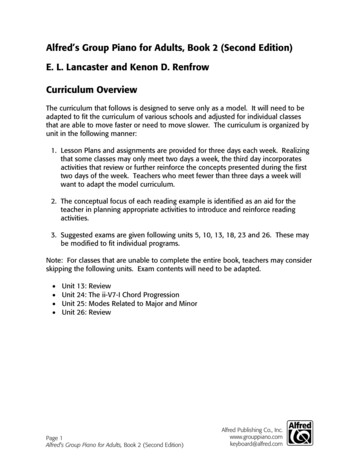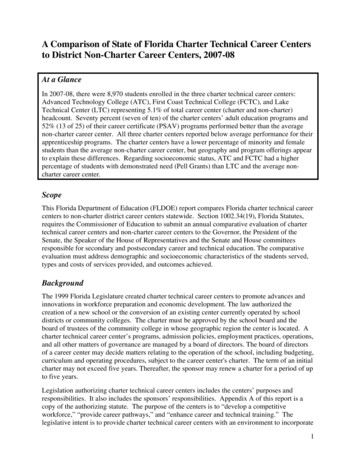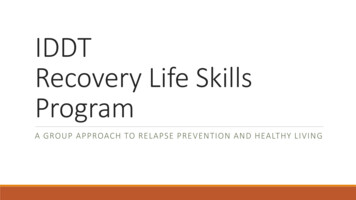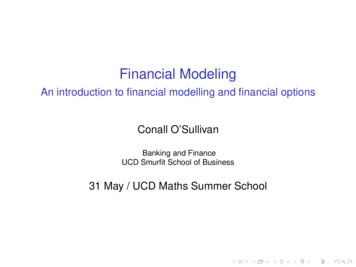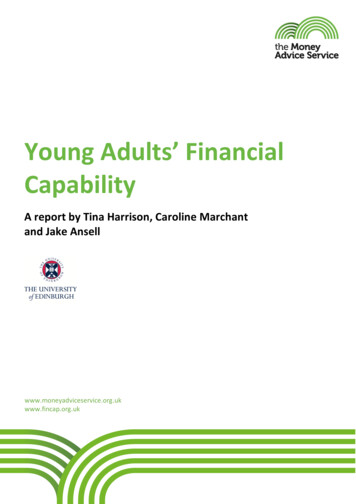
Transcription
Young Adults’ FinancialCapabilityA report by Tina Harrison, Caroline Marchantand Jake uk
Young Adults’ Financial CapabilityContentsExecutive summary01Introduction03Method04Aims and objectives04Goals and planning05Financial confidence11Engagement and barriers to engagement19Opportunities to engage young adults26Conclusions28moneyadviceservice.org.uk
Young Adults’ Financial CapabilityExecutive SummaryThis report builds on the Money Advice Service (MAS) UK Financial Capability Survey (2015). It specifically explores the‘young adult’ lifestage in relation to the Financial Capability Strategy Framework to better understand the ability of youngadults in managing day-to-day finances, planning ahead and negotiating financial difficulties. To date, young adults have notbeen a key focus of policy and recently MAS has highlighted that many young adults feel they experience financial difficultiesin taking responsibility for their own financial management. This report explores young adults’ financial capability in detail viaa ‘deep dive’ into the survey data which encompassed 744 young adult respondents from across the UK between the ages of18 and 24. In parallel, five focus groups were commissioned to challenge and further understand the nuances of thequantitative data. The focus groups comprised nine males and 14 females between the ages of 18 and 241 years from avariety of educational, work and domestic situations. Data analysis addressed the following key areas:nfinancial goal-setting and planning;nconfidence in managing money day to day and making financial decisions;nengagement and barriers to engagement; andnopportunities to help support young adults’ financial capability in the future.Goals and planningYoung adults were both more likely to have financial goals over the next five years (69%) and to have plans to achieve thosegoals (41%) (compared to all adults aged 18 ). Yet, the gap between having goals and having plans to achieve them waswider than for all other age-groups, suggesting a difficulty in financial planning. Overall young adult planning profiles weredivided into three groups: Planners, Dreamers and Drifters. The Planners were the most independent and showedconfidence and foresight in planning and tended to save for the future. The Dreamers, although having financial goals, wereless able to make financial plans, were less confident in managing their money and tended to be anxious about the future.The Drifters were less likely to have any financial goals, had little confidence with their money and tended to be the mostdependent on family financial support. Planning in the main tended to be focused on the achievement of short-term goalsand ‘save-to-spend’ planning; even the Planners tended to set only short-term goals and juggled the demands of planning forthe future with more immediate pressures. The Drifters tended towards passive acquiescence – accepting that dreams wouldnot be realised and long-term financial comfort would never happen to them. Young adults preferred to keep day-to-daymoney management simple. This led to a (potentially false) sense of financial confidence in the present, but coupled withlonger-term fears for financial security.Financial confidenceYoung adults had the lowest levels of financial confidence compared to other age groups. Only 45% rated themselves as ‘veryconfident’ (compared to 58% of all adults aged 18 ) and females generally rated themselves as less confident than males.Young adults who were in full-time employment and no longer living at home expressed more confidence in managingmoney and making financial decisions than students or young adults living in the parental home. Young adults with savings,credit cards and mortgages were more confident than those without, and over-indebted young adults were less confidentthan those who were not over-indebted.Confidence seems to come from experience rather than age alone and exposure to a wider range of situations, financialproducts and decisions. Many young adults talked of learning by experience. Both positive and negative experiences couldhave a beneficial impact on financial capability, especially learning from mistakes. Some transitions provided moreopportunities to experience financial products, such as the transition into the workplace compared with full-time educationwhich possibly explains the lower levels of confidence expressed by students.1One participant has recently turned 25.1
Young Adults’ Financial CapabilityBarriers to engagementThere were notable barriers to engagement with information and guidance sources. For all young adults, whether working orin education, the main trusted sources of information and guidance were parents or family. Beyond this, there was littleunderstanding of where to go for financial guidance – this was particularly true of females and Drifters.The bank was often accepted as the only other avenue but this was a reluctant relationship and banks were mistrusted bymost. Young adults were confused about financial guidance and advice, were unable to distinguish between money guidanceand regulated advice and perceived it all to be expensive and either for those with a lot of money to invest or conversely forthose in financial crisis. Similarly, other providers of guidance – such as the Money Advice Service and the Citizens AdviceBureau – were typically seen to be for those struggling financially.Young adults did discuss finances with peers when there was a shared reason, such as comparing insurance for holidays or onpassing their driving tests. There was also evidence of individuals self-advising via the internet, particularly Google. However,many of the young adults felt overwhelmed by the quantity of information available and experienced difficulty filtering thegood from the bad.The nature of engagement was influenced by financial confidence. Financially confident young adults were more likely toconsult professional sources of information and guidance, such as banks, compared with young adults who were notfinancially confident who tended to rely on informal sources of information, such as family and friends. The qualitativeresearch suggested that a level of understanding was necessary to engage with certain sources of guidance.Young adults were more likely to be over-indebted than other age groups, yet over-indebted young adults were less likely toseek debt advice compared with other age groups. The reasons for the lack of engagement with debt advice largelydepended on whether young adults lived at home, whether they were in full-time education and gender. Male young adultstended to have a more over-optimistic view that they could sort it out themselves, whereas female young adults tended toacknowledge that they needed help but didn’t know where to turn.Opportunities to engage young adultsIn summary, the findings pointed to the following opportunities to engage and support young adults:npinpointing ‘teachable moments’ at key points of transition;nidentifying peer, ‘near-peer’ or nominated experts for advice as points of transition are reached;nhighlighting ‘unbiased’ guidance and explaining what that means – as young adults do not trust or understandsuch terms in the light of their views on the financial services industry;ndeveloping education-based practical skills from childhood – the importance of this was stressed by manyparticipants;nbuilding on family trust as this was by far the most important avenue for information and guidance (albeitcomplicated by low levels of parental financial capability);nhighlighting an increased role for employers (possibly via apprenticeship schemes and graduate employmentschemes) in the provision of guidance or targeted interventions to support key transitional financial needs;nbuilding on online opportunities while addressing or avoiding the problem of overwhelming choice leadingto anxiety.2
Young Adults’ Financial CapabilityIntroductionThe period spanning the late-teens through to the late-twenties represents a transitional period in the life course, betweenadolescence and early adulthood, in which individuals often move into greater independent living and take on greaterresponsibility for their financial affairs (Arnett, 2015). This stage of young adulthood is a time when:“most young people in this age period feel like neither adolescents nor (fully) adults, but somewhere in between.”(Arnett, 2006: 113).Young adults today are experiencing a very different set of personal, economic and financial circumstances from those ofprevious generations. There is an increasing need for individuals to take more responsibility for their own financial future.Yet, changes in the housing market, pensions and employment patterns have combined to make the decisions individualsface more complex.The ability of young adults to cope effectively in this context has frequently been raised as a concern. Lusardi et al. (2010:375) describe young adults’ financial knowledge in the UK as:“dangerously low and potentially inadequate to deal with the complexity of current financial markets and products.”Despite government architecture being introduced to improve consumer financial capability in the UK (Atkinson et al. 2010;MAS 2012), young adults have not previously been a key focus of policy and potentially are in danger of falling through afinancial capability gap.Recent evidence from the Money Advice Service suggests that the young are far more likely to say they experience financialdifficulty ‘all the time’; and around three-quarters of individuals in their twenties admit to making money mistakes in theirfirst years of financial independence which have an impact on their lives for years to come.2Set against this backdrop, this report aims to understand young adults’ financial capability, what contributes to it and how itcan be supported and developed. Young adults are a key focus of the current Financial Capability Strategy for the UK.3This report provides insights into the factors that influence young adults’ financial goals and planning, financial confidenceand engagement in financial matters. Such insights help inform how to improve young adults’ ability to manage money wellday to day; prepare for and manage life events; and deal with financial difficulties.To complement this report, the Money Advice Service commissioned Family Kids & Youth to conduct a literature review ofavailable evidence on the effectiveness of different methods and interventions for engaging young adults.2It’s Time to Talk: Young People and Money s/mas money regrets online.pdf33Financial Capability Strategy for the UK. http://www.fincap.org.uk/
Young Adults’ Financial CapabilityMethodThe analysis was based on both quantitative and qualitative methods including:nsecondary data analysis of the quantitative data set from the Money Advice Service 2015 Financial CapabilitySurvey;nprimary analysis of focus groups conducted specifically to inform this work; andninsights from a review of published research specifically on young adults and financial services.The Financial Capability Survey comprised a total of 3,461 respondents drawn from across the UK, of which 744 were youngadults aged 18–24. Additionally, five focus groups were conducted, specifically for this report, comprising a total of 23 youngadults aged 18–24.4 Full details of the method and samples are shown in the Appendix.Aim and objectivesThe overall aim of the report is to provide a detailed understanding of the factors that promote or inhibit financial capabilityamong young adults, thus contributing directly to the Financial Capability Strategy for the UK.The Money Advice Service defines financial capability as:“a person’s ability to manage money well, both day to day and through significant life events, and to handle periods offinancial difficulty.”5To better understand financial capability in young adults and how to improve it, requires an understanding of the underlyingfactors that promote or inhibit it. With this in mind, the key objectives of the report are to understand the skills, knowledge,attitudes and motivations of young adults and how these contribute to financially capable behaviours. Accordingly, thereport covers the following main themes:nyoung adults’ financial goal setting and planning;nfactors affecting young adults’ confidence in managing money well and making financial decisions;nfactors affecting engagement of young adults; andnopportunities to increase engagement.4One participant recently turned 25.5Financial Capability Strategy for the UK, p.7. http://www.fincap.org.uk/4
Young Adults’ Financial CapabilityGoals and planningNearly seven in ten (69%) young adults reported having financial goals over the next five years (compared to 53% ofall adults aged 18 ), and 41% had plans for their financial goals (compared to 36% of all adults 18 ). It is perhaps notsurprising that a higher proportion of young adults, compared to other age groups, had financial goals: as individuals movethrough the life stages, financial goals – for example, for getting married, starting a family or moving house – are realised.What is worth noting is the relationship between financial goals and planning for financial goals. The gap between goals andplanning was greatest among young adults (see Figure 1). This suggests that although young adults have financial goals, theyseem less able to plan for those goals.Using regression analysis, the factors that exert an influence on young adults’ ability to plan for their financial goals included:attitudes, working status, extent of over-indebtedness and educational qualifications.Specifically, young adults who were most likely to have plans to achieve financial goals disagreed that they ‘prefer to live fortoday rather than plan for tomorrow’, felt it was important to keep track of income and expenditure, were employed(especially employed full-time), were not over-indebted, and had higher qualifications.Figure 1: Gap between financial goals and plans for financial goalsGiven the diversity among the young adult age group, cluster analysis was used to identify potential sub-groups of youngadults with similar characteristics according to attitudes, goals and planning, financial confidence and financial dependency.A three-cluster solution was produced.The primary classification variables were: the extent to which young adults have any financial goals for the future and theextent to which they have any plans for those financial goals. Based on the profiles, the three young adult groups werelabelled: Planners, Dreamers and Drifters (see Figure 2).5
Young Adults’ Financial CapabilityFigure 2: Three young adult sub-groupsnPlanners were the only group that had any financial goals that were also supported by plans to achieve thosegoals. They were the most confident in managing their money and in making financial decisions, and the leastlikely to be financially dependent on parents. In terms of attitudes, they were most likely to see saving for thelonger term as important (including saving for a rainy day and also for retirement). They were also more likely toperceive that they saved more than others on average (see Figure 3).nDreamers all had financial goals for the future but generally did not have plans in place to achieve those goals.They were less confident in managing their money and making financial decisions compared to Planners, butmore confident than Drifters. In terms of attitudes, they were most likely to feel anxious about their financialsituation. They were also most likely to perceive that they saved less on average than others (see Figure 3).nDrifters were the least likely of all three groups to have any financial goals for the future or any plans to achievethem. They were the least confident of all groups in managing their money and making financial decisions and themost likely to be financially dependent on parents. In terms of attitudes, they were the least likely to see savingfor a rainy day as important.This shows a complex picture of financial dependence/independence and financial planning: clearly the extent of financialdependency has an impact on young adults’ ability to have financial goals and plan for them. However, living in the parentalhome, but having some level of financial independence, can be beneficial. Further details on the individual characteristics ofthe groups from the survey data are provided in Table 1.The three groups were also evident in the qualitative research: of the 23 focus group participants, 11 were identified asPlanners, 6 as Dreamers and 6 as Drifters (see Table A3 in the Appendix).Engaging in certain types of financial products can also be associated with planning. For example, young adult homeownerswith a mortgage were most likely to plan for financial goals. Having a mortgage was likely to lead to the necessity to plan forother things. Almost two-thirds (63%) of young adults with a mortgage also had plans for financial goals, compared with 60%and 63% of young adults respectively in private or social rented accommodation who did not have a plan for financial goals.6
Young Adults’ Financial CapabilityTable 1: Characteristics of Planners, Dreamers and DriftersPlannersDreamersDriftersSample size37% (278)36% (264)27% (202)Any financial goals90% had financial goals100% had financial goalsZero had financial goalsAny plans for goalsAll had plans for goals99% did not have plans forgoalsDid not have plans forgoalsConfidence managingmoneyVery confident managingmoney (60% score 8–10)6Fairly confident in managingmoney (63% score 4–7)Fairly confident inmanaging money(52% score 4–7)Confidence makingfinancial decisionsVery confident making financialdecisions (48% score 8–10)6Fairly confident makingfinancial decisions (69%score 4–7)Fairly confident makingfinancial decisions(61% score 4–7)Financial dependencyLeast likely to be financiallydependent on parents (20% notat all dependent)Most likely to have mediumfinancial dependency onparents (42% score 4–7)7Most likely to befinancially dependent onparents (33% score 8–10)Attitudes52% agreed it is important tokeep track of income andexpenditure54% agreed that thinkingabout their financialsituation makes them feelanxiousOnly 20% agreed thatsaving for a rainy day isimportant50% agreed they do not preferto live for today rather thanplan for tomorrow45% agreed it is important toshop around to make moneygo further50% agreed that they do notprefer to live for todayrather than plan fortomorrow37% agreed it is important tosave money for a rainy dayTenure31% lived with parents;30% rented privately35% lived with parents;37% rented privately45% live with parents;25% rented privatelyEmployment status43% worked full-time;35% in full-time education;25% unemployed36% worked full-time;35% in full-time education;42% unemployed22% worked full-time;29% in full-timeeducation;33% unemployedMAS Segment26% Struggling; 30% Squeezed;43% Cushioned22% Struggling; 28%Squeezed; 50% Cushioned23% Struggling; 28%Squeezed; 50% Cushioned6Confidence in managing money and confidence in making financial decisions were measured on a 10-point scale: 0–3 not at allconfident; 4–7 fairly confident; 8–10 very confident.7Degree of financial dependency was measured on a 10-point scale: 0–3 low financial dependency; 4–7 medium financialdependency; 8–10 high financial dependency.7
Young Adults’ Financial CapabilityThe focus groups further explored the extent of financial goals and planning amongst young adults. Five key themesemerged:nthe gulf between short-term goals and long-term dreams;nhedonistic attitude – ‘you’re only young once’;ncomfortable between transitions – ‘I’ll cross that bridge when I come to it’;ndelegate to employers – ‘they will sort me out’;npassive acquiescence – ‘it will never happen for me’Figure 3: Planners’, Dreamers’ and Drifters’ perceptions of their level of savingShort-term goals with a gulf to long-term dreamsIn the main, young adults’ goals and plans towards those goals were largely focused on the short term, and primarily focusedon ‘save-to-spend’ goals – such as saving for a holiday, a car etc. Nearly half (47%) of young adults in the survey reportedsaving for a holiday and 30% were saving for a car.“I manage to save every month but it’s always to pay something I’m one of these people who has to go on like two orfour different holidays a year so I’ll always save like money at the end of the month, but it literally goes straight out againto pay for all these holidays.” Nicky (22, Focus Group 2, Dreamer)Goals seemed to be driven by short-term planning horizons, even amongst ‘Planners’. Young adults seemed to plan to thenext major event in life or purchase goal as illustrated by Kitty (19, Focus Group 1, Planner):“When I come back from Australia, my goal is to get a car and pay the insurance.”8
Young Adults’ Financial Capabilityor Vicky (20, Focus Group 5, Dreamer) who was saving for a trip to the USA for her 21st birthday and was giving a familymember her monthly savings so she was not tempted to dip into them. But even saving for the short-term can be difficult, asoutlined by Harriet:“I set myself small goals for like holidays or whatever. So I’ll save a couple of months and I’ll only save for that. I’mtrying to save to go travelling, but it’s hard.” Harriet (21, Focus Group 2, Dreamer)This short-termism seemed to lead to limited experience of products beyond the simple savings account, general insuranceor current accounts. For some, especially ‘Dreamers’, the future seemed a long way off and there was evidence of delayingfocus on the longer term (such as mortgages, retirement and pensions) in favour of the present.Even Olwyn (21, Focus Group 5, Planner) a ‘Planner’ who wanted to buy a house and was saving had no practical idea of whatto do next. This was also particularly true amongst ‘Dreamers’ like Penny:“When I worked at the library I paid into a pension there, but I wanted to go to Ibiza so I stopped and I took all the moneyout, but then I started it up again when I moved to the council, but then I just stopped it last month because I am skintthis year.” Penny, (21, Focus Group 2, Dreamer)Penny’s dream was to buy a house with her boyfriend and she was trying to plan, get rid of her debt and save, but short-termtemptation was getting in the way:“I owe my boyfriend money. I owe my sister money. I owe everyone money, but I’m actually hating it now. But it doesn’tcause me any stress or that, to be honest, like I just think I don’t care. But I do want rid of it I’ve worked out that I canbe debt-free by October . and I should have my credit card and everything else paid off by then. But now that I’m goingto Croatia ” Penny, (21, Focus Group 2, Dreamer)This contrasts with her friend Gina who was clearly more of a ‘Planner’. She worked as an administrator in a pensionscompany which had given her some exposure to pensions and had possibly contributed to her heightened awareness andengagement compared to other young adults:“I know a bit about pensions. So I put 4% and my company match it and also contribute 9%, so my pension pot is not toobad.” Gina (21, Focus Group 2, Planner)Guided by her boyfriend she also managed her monthly finance schedule as she strived to save for a deposit. Yet even for the‘Planners’ the difficulty of self-control was still evident as Gina notes, she is “terrible” with money:“I use a spreadsheet for everything! Just to get the chance to save, I’ll never probably do it. I live with my boyfriend but heowns his house, but I want to save up so I can own one with the Help to Buy ISAs and actually get a house as well, butthat’s going to be a long, long way away because I am terrible with money so ” Gina (21, Focus Group 2, Planner)This temptation, focus on the short term and the desire to live whilst young, is discussed further in the next section.Pleasure-seeking attitude – ‘you’re only young once’The focus on minimal, short-term planning seemed to be fuelled by the attitude that this is the time for fun and a ‘you’reonly young once’ attitude. This was particularly true of the ‘Dreamers’ and ‘Drifters’. Here the temptations of hedonismseemed to be stronger than saving for the future, and the short-term priorities such as the ‘need’ for ‘at least’ one foreignholiday a year, for example. For many participants there seemed to be ‘plenty of time’ to be sensible, as Donna suggested:“I feel like I’m only 21, I want to have fun, I don’t want to sit in the house on a Saturday night and that, like I’d rather goout and be with my friends, I’ve got plenty of time to start saving.” Donna (21, Focus Group 2, Planner)Some participants had debts that they perceived were controllable, such as Nicky who would rather have fun now and payback debts more slowly:“I’m not really one to save for like any sort of future plans right now but I’ve still got quite a bit of debt that I’m trying topay off and I could easily pay it off so quickly but I’d rather not.” Nicky (21, Focus Group 2, Dreamer)9
Young Adults’ Financial CapabilitySimilarly, Lara (21, Focus Group 5, Dreamer), despite finding it difficult to move back home would rather do that to avoidexpensive rent and enjoy more fun, delaying her independence. Most young adults seemed to have a self-awareness andseemed to be able to regulate their spending to avoid real financial issues at the end of each month to ensure they (nearly)balanced the books.Even if they were spending too much they seemed to be aware that it wasn’t sustainable. For many young adults, theirhedonistic lifestyle was tinged with an ever-present fear that spending might get out of control, so needed close monitoring,but in the belief that they will become more sensible in future. For many there was the general feeling that they couldn’tafford to save anyway, which perhaps legitimised the focus on the present and short-term save-to-spend behaviour evidentfrom both the survey data and the focus groups. This was particularly the case amongst the ‘Drifters’.Managing fine between transitions – ‘I’ll cross that bridge when I cometo it’This stage of young adulthood is characterized by transitions and change: leaving school, going to university, starting a job,leaving home, renting/buying a home etc. Young adults’ planning horizons appeared to be focused on the next transition orchange point in life. Between transitions, however, young adults were happy to avoid pro-active change in their financialsituation; comfortable in the knowledge that, in the short term at least, they felt that things were in control. Consequently, itwas common for many to delay or avoid certain transitions so as to escape any associated financial change. Helen (18, FocusGroup 1, Planner) noted that she planned to live at home again in the second year of her university degree to avoid financialchange: ‘so I’m just leaving it this year.’Delegate to employers – ‘they will sort me out’Frequently participants assumed that planning and financial decision making could be delayed until they were in employmentand some of these decisions could possibly be delegated to an employer. For example, nursery nurse Vicky (20, Focus Group5, Dreamer) assumed: “we could ask the nursery’s accountant, [or] our boss might know that”, or Oscar, (18, Focus Group 1,Drifter) who believed that when he joins the army they will sort everything out for him “if he asked them”, delegating hisfinancial planning to his prospective employer.Many of the working young adults knew they had pension arrangements but could not articulate their employer’sinvolvement and the many ‘Drifters’ in Focus Group 3 felt that their low-paid hospitality work negated employer support orany help with their finances. In contrast, their short-term contracts led to their sense of insecurity and ongoing ‘drifting’which will be discussed further in the next section.Passive acquiescence – ‘it will never happen to me’Not surprisingly, those exhibiting passive acquiescence tended to be the ‘Drifters’ in lower-paid jobs, often relying on familyto make ends meet. Sometimes participants were content with lower incomes, enjoying their job or following ambitions totravel and delaying financial/other life decisions.Others were more downbeat about the future, taking a depressive view, expressing limited expectations of being able tofund their goals, dreams or reach their potential – such as feeling that they might never afford a house or launch theirown business:“Yes, short-term is fine, it’s the long-term that you just don’t see a goal at the end of it, that’s the only thing.”(Doug, 23, Focus Group 3, Drifter).A few participants who were working in the hospitality sector were particularly downbeat about the long term, citing “lotterywins” as their only way out, or accepting the need to change the career that they enjoy to a better-paid job that they mightnot like as much just to be able to fund their dreams of owning a home or running a business.Most participants expected instability in their circumstances and finances for some time with a reluctant acceptance thatthey may have to either live at or return home at some point or keep “throwing money away” on renting.10
Young Adults’ Financial CapabilityFinancial confidenceThe Financial Capability Survey measures two aspects in relation to financial confidence: confidence in managing money andconfidence in making financial decisions. In general, for all adults (18 ) as well as for young adults specifically, confidence inmanaging money is higher than confidence in making financial decisions. There is evidence from the data analysis that certainfactors impact differently on these two elements of financial confidence.We explored the link between financial confidence and a number of factors individually and in combination. The findingsreve
Young Adults' Financial Capability 4 Method The analysis was based on both quantitative and qualitative methods including: n secondary data analysis of the quantitative data set from the Money Advice Service 2015 Financial Capability Survey; n primary analysis of focus groups conducted specifically to inform this work; and n insights from a review of published research specifically on young .
